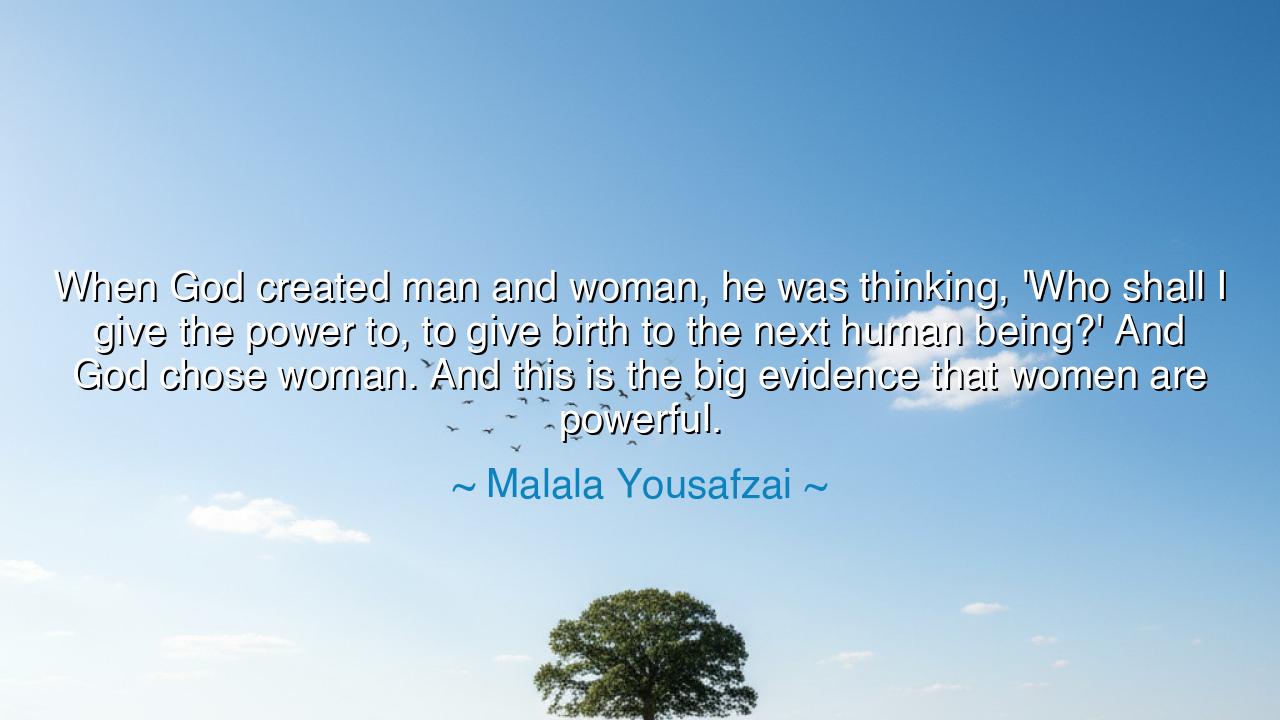
When God created man and woman, he was thinking, 'Who shall I
When God created man and woman, he was thinking, 'Who shall I give the power to, to give birth to the next human being?' And God chose woman. And this is the big evidence that women are powerful.






In the words of Malala Yousafzai, the mystery of creation is unveiled: “When God created man and woman, He was thinking, ‘Who shall I give the power to, to give birth to the next human being?’ And God chose woman. And this is the big evidence that women are powerful.” This is not a mere saying, but a torch of truth that has burned through the ages. It tells us that in the divine order, the gift of life-bearing was entrusted not to kings nor warriors, but to the gentle strength of women. This is a sign from the heavens that true power lies not only in conquest or command, but in the sacred ability to nurture, to sustain, and to bring forth new existence.
From the dawn of time, humanity has revered this hidden force. The ancients told stories of goddesses—Isis of Egypt, Demeter of Greece, Shakti of India—each embodying the creative essence of life itself. These tales were no accidents; they were born from the recognition that within woman lies a sacred fire, a trust placed by the divine. Malala’s words echo these old songs, reminding us that the miracle of birth is not a weakness but the highest proof of strength, chosen by God Himself.
Consider the story of Sojourner Truth, the enslaved woman who rose in the 19th century to declare, “Ain’t I a Woman?” Though she bore children stolen from her arms, she stood with a voice like thunder to demand freedom and dignity for her people. Was her power in sword or army? No—it was in the courage to speak, to endure, to remind a nation of its sins. Her strength was the strength Malala speaks of: the power given to women, both to create life and to defend it with unyielding spirit.
Let none say, then, that the role of women is lesser. For the warrior may guard the gates, and the sage may keep wisdom, but without woman the very thread of human destiny would break. To deny her power is to deny life itself. This is why Malala calls us to open our eyes: the gift of creation was not randomly given, but entrusted as a mark of honor, a divine evidence of women’s eternal might.
So, let the generations remember: when they see a mother, a sister, a daughter, they look upon a vessel of sacred power. This is no frailty, but the truest form of strength. And if ever doubt arises, return to Malala’s wisdom—for in the act of giving life rests the most profound proof that women are powerful beyond measure.






THTran Hien
Malala’s words remind us of the immense responsibility and power that women hold, but it also makes me wonder about the broader implications. If this divine choice to grant women the power of birth reflects a unique strength, how do we ensure that this power is acknowledged in all aspects of society? Are we providing women with the opportunities to leverage this power in political, economic, and social arenas?
LTTuyen Luong thi
Malala’s quote highlights the sacred power of women through their ability to bring new life into the world, but it also raises important questions about how society perceives this power. How often do we, as a society, undervalue the power of women in various other roles? Shouldn't women’s power and influence be recognized in all areas of life, not just in the context of childbirth or family roles?
NLNguyen Nha Linh
Malala’s statement is a powerful reflection on women’s innate strength, especially in the context of creation. It’s thought-provoking to consider that this act of giving life symbolizes a deep well of power. However, can we see this as more than just physical power? How do we also celebrate the intellectual, emotional, and leadership powers of women, which often go unnoticed in discussions focused solely on biological roles?
DTCong Duong Thanh
Malala Yousafzai’s quote beautifully highlights the unique and powerful role women play in society. By pointing to the ability to give birth, she underscores the physical, emotional, and cultural power women hold. But, beyond just childbirth, should we also be recognizing the countless other ways women contribute to shaping the world? What does this perspective say about how society values or overlooks women's contributions outside of motherhood?